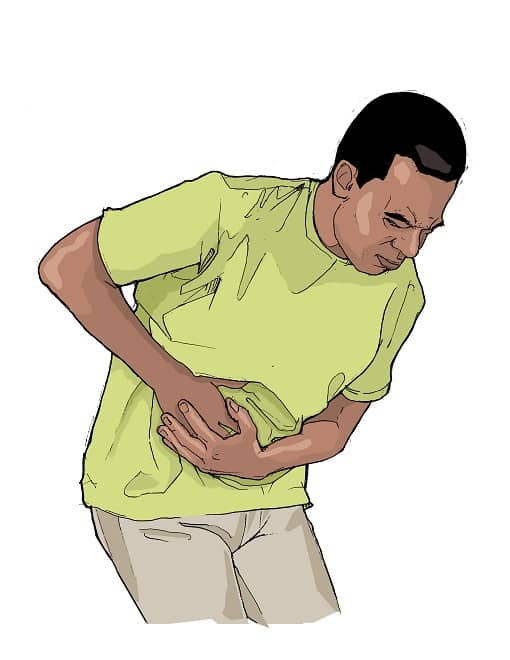Zofran belongs to the group of medicines called antiemetics. Ondansetron is a 5HT3 receptor antagonist. It works by inhibiting 5HT3 receptors in neurons located in the central and peripheral nervous systems.
Zofran is used to prevent nausea and vomiting caused by
- Chemotherapy in the treatment of cancer in adults and children over 6 months of age.
- Radiotherapy in the treatment of cancer in adults.
- Prevent postoperative nausea and vomiting in adults.
Gastroenteritis, commonly known as “stomach flu”, is a condition that causes irritation and inflammation of the stomach and intestines (gastrointestinal tract).
What are the symptoms of gastroenteritis?
The most common symptoms of gastroenteritis are:
- Diarrhea
- Nausea
- Vomiting
- Abdominal cramps
This can sometimes be confusing because influenza (flu) symptoms include:
- Headache
- Muscle pain and pain
- Respiratory symptoms
- Influenza does not affect the gastrointestinal tract.
The term gastric influenza is associated with a viral infection, but there may be other causes of infection.
The most common cause of stomach flu is Viral infection. However, bacteria, parasites, and foodborne diseases (such as shellfish contaminated by sewage, or consumption of raw or uncooked shellfish from contaminated water) can also cause unpleasant causes. Many people who experience vomiting and diarrhea resulting from this type of infection or irritation think they have “food poisoning” even though they can get food poisoning.
What do you need to know before you start taking Zofran?
Do not take Zofran
- If you are allergic (hypersensitive) to ondansetron or any of the components of Zofran.
- If you have or have had an allergic reaction (hypersensitivity) with other medications for nausea or vomiting (for example, granisetron or dolasetron).
Does Zofran cause constipation?
If you suffer from a blockage in the intestine or if you suffer from severe constipation. Zofran can increase blockage or constipation.
Warnings and precautions
Consult your doctor or pharmacist before using Zofran.
- If you have ever had heart problems, including irregular heartbeat (arrhythmia).
- If you are undergoing a tonsil operation.
- If you have liver problems.
- If you are going to have a diagnostic test (including blood, urine, skin tests that use allergens, etc.), tell your doctor that you are taking this medicine, as it may alter the results.
Zofran Uses with other medications
Tell your doctor or pharmacist if you are using or have recently used or might have to use any other medication. In particular, it is important to inform the doctor if you are taking any of the following medications, as it may be necessary to stop the treatment or adjust the dose of any of them:
- Rifampicin (an antibiotic used to treat infections such as tuberculosis).
- Tramadol (a medicine used to treat pain).
- Phenytoin or carbamazepine (medicines used to treat epilepsy).
- Medicines used to treat heart problems such as heartbeat abnormalities (antiarrhythmics) and/or to treat high blood pressure (beta-blockers).
- Haloperidol or methadone (medicines that can affect the heart).
- Anthracyclines and Trastuzumab (medicines used to treat cancer).
- Fluoxetine, Paroxetine, Sertraline, Fluvoxamine, Citalopram, Escitalopram (Selective serotonin reuptake inhibitors, used to treat depression and/or anxiety).
- Venlafaxine, Duloxetine (serotonin and norepinephrine reuptake inhibitors, used to treat depression and/or anxiety).
Tell your doctor or pharmacist if you are taking any of these medications.
Pregnancy and breastfeeding
If you are pregnant or breastfeeding, think you may be pregnant or intend to become pregnant, consult your doctor or pharmacist before using any medication, as Zofran may cause harm to the fetus. As with other drugs, you should not use Zofran during pregnancy, especially during the first trimester, unless the expected benefit to the patient outweighs any risk to the fetus. If you are a woman of childbearing age, your doctor or nurse should check if you are pregnant and have a pregnancy test before starting treatment with Zofran.
Women of childbearing age should use an effective method of contraception during treatment with Zofran. Consult your doctor about contraceptive method options. If you become pregnant during treatment with Zofran, tell your doctor. Breastfeeding is not recommended during treatment with Zofran. The ingredients of Zofran (ondansetron) can pass into breast milk and can affect your baby. 8 WAYS TO RELIEVE INDIGESTION DURING PREGNANCY
How to take Zofran?
Your doctor will tell you exactly how much you should take Zofran. If in doubt, consult your doctor or pharmacist again. Remember to take your medicine. Swallow the tablets whole, with the help of some water. Your doctor will tell you the duration of your treatment with Zofran. Do not stop treatment earlier.
Nausea and vomiting caused by chemotherapy or radiotherapy
Adults: Two tablets (8 mg) orally, 1-2 hours before the medical treatment potentially causing nausea and vomiting, and then 2 tablets (8 mg) 12 hours later. To prevent nausea and vomiting on subsequent days, continue taking 2 tablets (8 mg) every 12 hours for five days.
Nausea and vomiting caused by chemotherapy
Children over 6 months and teenagers: The doctor will decide the dose based on your child’s weight or body surface. Normally, twelve hours after chemotherapy, your child will receive Zofran by mouth. The usual dose is 4 mg twice daily and may continue for a period of up to 5 days.
Postoperative nausea and vomiting
Adults: To prevent nausea and vomiting after surgery, 4 tablets (16 mg) orally, 1 hour before anesthesia.
Children: There are no data on the oral administration of Zofran in the prevention of postoperative nausea and vomiting in children.
Dose settings
Patients with liver failure: In patients with liver problems, the dose should be adjusted to a maximum of 8 mg daily of Zofran.
Elderly patients, patients with renal insufficiency or slow metabolizers of spartein/debrisoquine: It is not necessary to modify the daily dose or dose frequency or route of administration.
Treatment duration
Your doctor will decide the duration of your treatment with Zofran. Do not stop treatment earlier. If you think that Zofran’s action is too strong or weak, tell your doctor or pharmacist.
If you take more Zofran than you should?
In case of overdose, the symptoms that may appear are: vision problems, low blood pressure (which can cause dizziness or fainting) and palpitations (irregular heartbeat). If you or your child takes more Zofran than you should, talk to a doctor or go to the nearest hospital immediately, indicating the medication and the amount ingested. Take the medicine with you.
If you forget to take Zofran?
Do not increase or decrease the dose without the doctor’s authorization. In case you forget to take a dose and experience discomfort or vomiting, take another dose as soon as possible. Then, continue taking the medication as directed. In case you forget to take a dose and do not have any discomfort, wait for the next dose and continue taking the medication as directed.
Zofran Side Effects
Zofran can also cause side effects like other medicines, although not everybody gets them.
Very common side effects:
They can affect more than 1 in 10 patients taking Zofran: Headache
Frequent adverse effects:
They can affect up to 1 in 10 patients taking Zofran:
- Feeling hot or blushing
- Constipation
Uncommon side effects
They can affect up to 1 in 100 patients taking Zofran:
- Upward rotating movements of the eyes, abnormal muscle stiffness, body movements, tremor.
- Slow or irregular heartbeat.
- Lower than normal blood pressure (hypotension).
- Increased levels in the results of blood tests to check the functioning of the liver.
Rare side effects:
May affect less than 1 in 1,000 patients taking Zofran:
- Sudden onset of pitos and chest pain or tightness.
- Skin rash or hives on any part of the body.
- Heart rhythm disturbance (sometimes it can cause a sudden loss of consciousness).
- Blurry vision.
If you experience any of these symptoms, stop taking the medication immediately and tell your doctor.
Very rare side effects:
They can affect less than 1 in 10,000 patients taking Zofran:
- Transient blindness, which usually resolves in 20 minutes.
- Electrocardiogram abnormalities.
- Extensive skin rash with blisters and peeling, which greatly affects the body surface (toxic epidermal necrolysis).
If you have any of these symptoms, tell your doctor immediately.
What should you avoid while taking Zofran?
Zofran may impair your thinking or reactions. Be careful if you drive or have to do something that requires you to stay alert.
- Keep the medicine in an aluminum bag until you are ready to use it. Store the medicine at room temperature away from heat and direct sunlight. Do not freeze.
- Keep out of reach of children.
- Do not store obsolete or unnecessary medicines.
- Ask your health care professional about how to get rid of unused medicines.
Should I go to urgent care for stomach flu?
Yes, you should go to the urgent care for stomach flu.
Zofran dosage for stomach flu
You should consult your doctor or pharmacist about the dosage of Zofran for stomach flu.









